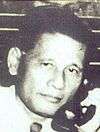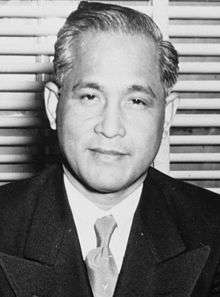Philippine Senate election, 1947
| | ||||||||||||||||||||||||||||||||||||||||||||
| ||||||||||||||||||||||||||||||||||||||||||||
| ||||||||||||||||||||||||||||||||||||||||||||
| ||||||||||||||||||||||||||||||||||||||||||||
 |
| This article is part of a series on the politics and government of the Philippines |
|
Legislature
|
|
Constitutional Commissions |
Elections for the Senate of the Philippines were held on November 11, 1947, with eight of the 24 seats in the Senate being contested. Eight seats were all regular elections; the winners were eligible to serve six-year terms from December 30, 1947 until December 30, 1953. Many gubernatorial and local elections were held on the same date.
Summary
Going into the 1947 election, the Senate consisted of nine Liberals, 14 Nacionalista, and one Popular Front (Vicente Y. Sotto). Of the seats up for election in 1947, all eight seats are held by Nacionalistas.
Senate President Jose Avelino, president of the Liberal Party, scored the opposition and said, “the Nacionalista Party of today is not the party of Quezon and Osmeña ... (it is) the party of Hukbalahaps and other dissident elements.” In response, Nacionalista Party President Eulogio Rodriguez appealed for the voters to give the opposition a stronger mandate to fiscalize the administration, which they accused of being corrupt and incompetent.[1]
In the 1st Congress, the Liberals hold 14 seats in the Senate, thereby retaining control of the Senate. The Liberals total was reduced to 13 seats pursuant to the Senate Electoral Tribunal resolution in which Senator Carlos Tan (Liberal) was unseated and replaced by Eulogio Rodriguez (Nacionalista) in 1949.
Geronima Pecson became the first woman to be elected in the Senate.
Results
Per candidate
| Rank | Candidate | Party | Votes | % | ||
|---|---|---|---|---|---|---|
| 1. | Lorenzo Tañada | Liberal | 1,570,390 | 48.1% | ||
| 2. | Vicente Madrigal | Liberal | 1,562,825 | 47.9% | ||
| 3. | Geronima Pecson | Liberal | 1,559,511 | 47.8% | ||
| 4. | Emiliano Tria Tirona | Liberal | 1,552,545 | 47.6% | ||
| 5. | Fernando López | Liberal | 1,543,830 | 47.3% | ||
| 6. | Camilo Osías | Nacionalista | 1,512,196 | 46.3% | ||
| 7. | Pablo Angeles David | Liberal | 1,489,014 | 45.6% | ||
| 8. | Carlos Tan1 | Liberal | 1,480,305 | 45.3% | ||
| 9. | Primitivo Lovina | Liberal | 1,473,888 | 45.2% | ||
| 10. | Eulogio Rodriguez, Sr. | Nacionalista | 1,346,174 | 41.2% | ||
| 11. | Felixberto Serrano | Nacionalista | 1,236,649 | 37.9% | ||
| 12. | Jose Ma. Veloso | Nacionalista | 1,225,347 | 37.5% | ||
| 13. | Emilio Javier | Nacionalista | 1,210,419 | 37.1% | ||
| 14. | Sotero Cabahug | Nacionalista | 1,209,598 | 37.1% | ||
| 15. | Jesus Barrera | Nacionalista | 1,201,329 | 36.8% | ||
| 16. | Jose Imperial | Nacionalista | 1,172,741 | 35.9% | ||
| 17. | Hilario C. Moncado | Modernist | ||||
| 18. | Manuel Dikit | Modernist | ||||
| 19. | Melchor Lagasca | Modernist | ||||
| 20. | Rosendo Zaldarriaga | Democratic Party | ||||
| 21. | Leonardo Tenebro | Modernist | ||||
| Total turnout | 3,264,423 | 77.1% | ||||
| Total votes | 22,474,462 | N/A | ||||
| Registered voters | 4,233,528 | 100.0% | ||||
| Note: A total of 21 candidates ran for senator. | Source:[2] | |||||
- ^1 Replaced by Eulogio Rodriguez as per decision of Senate Electoral Tribunal dated December 16, 1949.
Per party
| Party | Popular vote | Seats | |||||||
|---|---|---|---|---|---|---|---|---|---|
| Total | % | Won | 1946 | End 1st | 2nd | +/− | |||
| Start | % | ||||||||
| Liberal | 12,241,929 | 54.5% | 7 | 0 | 10 | 16 | 66.7% | | |
| Nacionalista | 10,114,453 | 45.0% | 1 | 0 | 14 | 7 | 29.2% | | |
| Independent | 102,998 | 0.5% | 0 | 0 | 0 | 0 | 0.0% | | |
| Young Philippines | 13,441 | 0.1% | 0 | 0 | 0 | 0 | 0.0% | | |
| Goodwill Party | 1,641 | 0.0% | 0 | 0 | 0 | 0 | 0.0% | | |
| Popular Front | 0 | 0.0% | 0 | 1 | 1 | 1 | 0.0% | | |
| Totals | 22,474,462 | 100.00% | 8 | 24 | 24 | 24 | 100.0% | | |
See also
References
- ↑ Philippine Electoral Almanac. The Presidential Communications Development and Strategic Planning Office. 2013. p. 22.
- ↑ Dieter Nohlen, Florian Grotz and Christof Hartmann, ed. (2001). Elections in Asia and the Pacific Vol. II. Oxford University Press. pp. 185–230. ISBN 0199249598.

